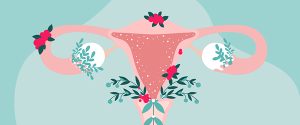
PCOS Management
Both these diseases are associated with ovaries. PCOS is an endocrine system disorder while PCOD is a condition developed by the hormonal imbalance.
Today, 1 in every 7 women in India have PCOS. Polycystic Ovary Syndrome (PCOS), or earlier known as PCOD (Polycystic Ovary Disorder) are a hormonal condition in women that affects a woman’s hormone levels.
Women with PCOS produce higher-than-normal amounts of male hormones. This hormone imbalance causes their body to skip menstrual periods and makes it harder for them to get pregnant.
It is a condition in which women face irregular and infrequent menstrual periods along with secondary symptoms of PCOS like excessive hair growth, heavy menstrual bleed and pain, insulin resistance, hair thinning, acne, hirsutism (elevated male hormones) that leads to growth of dark coarse hair all across the body. Sleep apnea, mood swings, fatigue and weight gain are also additional symptoms of PCOS. PCOS or PCOD-more popularly known in India today – cannot be treated, but the symptoms of PCOS / PCOD can be managed with nutrition and Ayurveda.
Process to manage PCOS/PCOD
PCOS/PCOD symptoms can be managed with the right nutrition, and Ayurveda herbs. PCOS itself cannot be treated, but symptoms like insulin resistance, hair growth, irregular menstrual periods and others can be easily treated with an integrated approach to the condition. The weight loss restores the normal functioning of the ovaries, which results in the reduction of male hormones, regularizes menstrual periods and improves fertility.
With a few lifestyle changes At SvayamHEAL we combine powerful yet simple benefits of eating natural & nutritious food along with Ayurveda treatment.
• Nutrient-dense Low-GI diet.
• Stress and anxiety management
• Mood management
• Herbal therapy Special exercises to help manage pcod-pcos symptoms.

Post Pregnancy Diet Plan
Thyroid disease is very common, with an estimated 20 million people around the globe having some type of thyroid disorder. A woman is about five to eight times more likely to be diagnosed with a thyroid condition than a man. Thyroid has an important job to do within your body like releasing and controlling thyroid hormones that control metabolism. Metabolism is a process where the food you take into your body is transformed into energy.
Hyperthyroidism can include symptoms like anxiety, irritability and nervousness, having trouble sleeping, losing weight, and experiencing irregular menstrual periods, having vision problems or eye irritation. Whereas hypothyroidism can include symptoms like Feeling tired, Gaining weight, having frequent and heavy menstrual periods, having dry and coarse hair, experiencing intolerance to cold temperatures.
We at SvayamHEAL provide you proper aurvedic treatment by balancing your doshas and control your body by including certain dietary modifications which will help you in better recovery for a better lifestyle management.
How it Works
- Ayurveda Treatments according to your body Prakriti
- Customized Diet plan
- Lifestyle Changes
- Moderate Regular Exercise.

Digestive Disorders
Indigestion, acidity, Constipation and what else!!
A poor digestion can relate to many factors considering a discomfort gastrointestinal condition occurred in many individuals with different age groups be it children’s or adults or elderly people. If it is left untreated then it may end damaging your gut health, esophagus increase of developing cancer. While the conventional line of treatment may offer medications that offer instant relief, the discomforts may recur soon after the medicines are stopped if the underlying root cause is left untreated.
We at SvayamHEAL provide you an effective line of treatment with diet plan and Ayurveda, with a customized plan providing you the right food and treatment with the help of our expert team.
How we Work
- Suggesting the proper intake of food which are rich in fibre
- Providing a customized diet plan to control your digestive disorders
- Ayurveda Treatment advised based on your prakruti.
- Regular Moderate Exercise

High Blood Pressure
Blood Pressure also known as Hypertension, a silent killer which can damage your health organs if not treated at the right time. Usually this is occurred by sedentary lifestyle, lack of exercise, stress, Drinking and smoking. It can damage to organs such as kidney, heart, brain if it is uncontrolled.
Hence it is always important to note that Lifestyle Modifications, Diet plans and certain medications can control the levels of Hypertension.
We at SvayamHEAL work on your requirement by making certain changes in your diet plan and lifestyle considering to your blood pressure requirements and other health needs with Ayurveda.
How we Work
- By following a Healthy Diet Plan
- Personalized food plan
- Ayurveda Treatments
- Moderate Exercise

Menopause
Menopause is the end of a woman’s menstrual cycles. The term can describe any of the changes you go through just before or after you stop having your period, marking the end of your reproductive years.
Menopausal Syndrome includes symptoms associated with the physiological changes that take place in a woman’s body as period of fertility ends. Menopause is a normal consequence of the ageing process and is a natural female hormone deficient state that occurs at the age of 45-55 years. In this stage, ovaries gradually become less active and reduce their production of sex hormone (estrogen and progesterone).
Process to manage Menopausal Symptoms
With few changes with combination of Aurveda and Diet, we can control the symptoms with
* Consumption of seasonal fruits, nuts, milk, wheat products etc.
* Maintain Healthy body weight
* Avoid heavy and unwholesome food, excess pungent, salty and sour food items.
* Regular exercise.
* Use of rasayana medications.

Fatty Liver and cholesterol management
A person can help prevent health problems, such as damage to the liver, by reducing high levels of LDL cholesterol. They can lower cholesterol by eating a healthful diet, with plenty of fruits and vegetables. Saturated fats contain a high level of cholesterol.
Control your cholesterol levels with your favorite food…!!!
Contact us for the best healing therapy
Balanced cholesterol levels are important to maintaining good health. Government statistics reveal that 3/4th of India’s population does not have normal cholesterol levels. Of these, people in the age group of 25 to 69 are at a higher risk of cardiovascular diseases.
The importance of making smart health choices needs to start early in life!
Your weight, diet, lifestyle, exercise & genetics all play a significant role, so regulating these can help you lower bad cholesterol.
Our integrated process is easy-to-follow and helps to reduce low-density lipoprotein (LDL) and boost high-density lipoprotein (HDL) levels by implementing 3 vital lifestyle components-
*Healthy cholesterol diet plan
*Herbal therapy
*Moderate exercise.

Thyroid
Thyroid disease is very common, with an estimated 20 million people around the globe having some type of thyroid disorder. A woman is about five to eight times more likely to be diagnosed with a thyroid condition than a man. Thyroid has an important job to do within your body like releasing and controlling thyroid hormones that control metabolism. Metabolism is a process where the food you take into your body is transformed into energy.
Hyperthyroidism can include symptoms like anxiety, irritability and nervousness, having trouble sleeping, losing weight, and experiencing irregular menstrual periods, having vision problems or eye irritation. Whereas hypothyroidism can include symptoms like Feeling tired, Gaining weight, having frequent and heavy menstrual periods, having dry and coarse hair, experiencing intolerance to cold temperatures.
We at SvayamHEAL provide you proper aurvedic treatment by balancing your doshas and control your body by including certain dietary modifications which will help you in better recovery for a better lifestyle management.
How it Works
- Ayurveda Treatments according to your body Prakriti
- Customized Diet plan
- Lifestyle Changes
- Moderate Regular Exercise.

Fatty Liver and cholesterol management
A person can help prevent health problems, such as damage to the liver, by reducing high levels of LDL cholesterol. They can lower cholesterol by eating a healthful diet, with plenty of fruits and vegetables. Saturated fats contain a high level of cholesterol.
Control your cholesterol levels with your favorite food…!!!
Contact us for the best healing therapy
Balanced cholesterol levels are important to maintaining good health. Government statistics reveal that 3/4th of India’s population does not have normal cholesterol levels. Of these, people in the age group of 25 to 69 are at a higher risk of cardiovascular diseases.
The importance of making smart health choices needs to start early in life!
Your weight, diet, lifestyle, exercise & genetics all play a significant role, so regulating these can help you lower bad cholesterol.
Our integrated process is easy-to-follow and helps to reduce low-density lipoprotein (LDL) and boost high-density lipoprotein (HDL) levels by implementing 3 vital lifestyle components-
*Healthy cholesterol diet plan
*Herbal therapy
*Moderate exercise.

Immunity
Pregnancy changes your body in more ways than you might expect. And it doesn’t stop when the baby is born. A few days after birth, you might experience full, firm, tender breasts (engorgement), elevated hormone levels; symptoms also include mood swings, crying spells, anxiety and difficulty sleeping, Loss of appetite, overwhelming fatigue and lack of joy in life shortly after childbirth, you might have postpartum depression.
We at SvayamHEAL, help you to recover & get rid of these symptoms, with the help of a balanced meal which regularize your body requirement and needs occurred during postpartum.
How it Works
- Nutritious Meal – Served according to you and your baby’s need.
- Proper guidance and emotional counseling being provided by the team to manage your mood swings with lifestyle changes
3. Moderate exercises.



